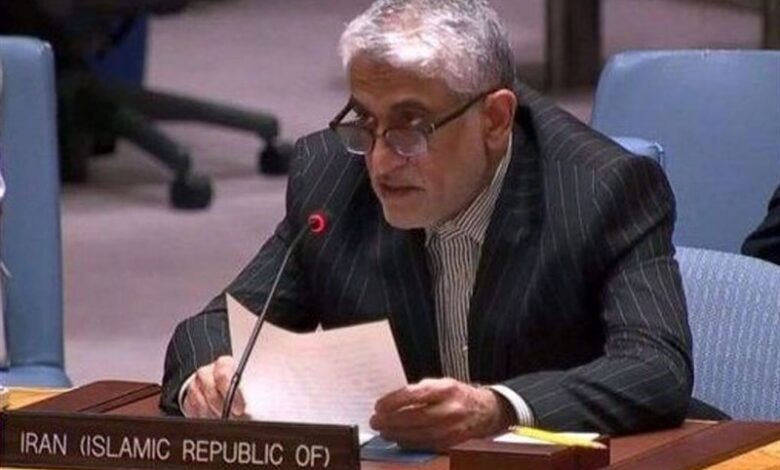Iran warned about the danger of nuclear weapons in the hands of the illegitimate Israeli regime

| Iran’s ambassador and permanent representative to the United Nations said that recent nuclear threats by high-ranking officials of the Israeli regime against Iran and Palestine highlight the danger of these weapons in the hands of such an illegitimate regime. |
According to Tasnim News Agency, Amir Saeed Irvani, Ambassador and Permanent Representative of Iran to the United Nations in The “Middle East region free of nuclear weapons and other weapons of mass destruction” conference made a speech. The necessity of creating a Middle East region free of all weapons of mass destruction is emphasized. The existence of such weapons, at the regional or global level, is considered a threat to humanity and often acts as a tool for blackmail. At the international level, there is an urgent need to address the risks associated with the possible sharing and proliferation of nuclear weapons by the United States and NATO. , has raised real and widespread concerns about proliferation. Recent nuclear threats by high-ranking officials of the Israeli regime against Iran and Palestine highlight the danger of these weapons in the hands of such an illegitimate regime. In light of recent atrocities in the Middle East, we express our immediate concern about Israel’s policy of nuclear ambiguity and the potential use of weapons of mass destruction in the conflict in Gaza or elsewhere, if not prevented now. The secrecy of Israel’s nuclear capabilities poses a significant threat to regional stability and calls for urgent action to address this issue. In this critical era, the need to create such a region in the Middle East has never been so urgent. Now, more than ever, creating a Middle East free of weapons of mass destruction is a fundamental step towards a safer and more secure future. Israel” which was adopted with the full and valuable support of the OIC member states on November 6, 2023. We suggest that another statement be issued by this conference condemning the nuclear threat posed by the Israeli regime. The purpose of this declaration is to condemn the use or threat of nuclear weapons and to emphasize the necessity of transparency, responsible behavior and commitment to peaceful resolutions in the region. Wake up and accept. The actions of the Israeli regime, including examples of terrorism and sabotage against civilian nuclear programs and scientists in the region, require the immediate intervention of international institutions such as the United Nations Security Council and the International Atomic Energy Agency. On the other hand, the refusal Israel’s refusal to participate in this vital conference, bolstered by the unwavering support of the United States, is indefensible. Such reluctance and foreign support prevent critical discussions for global security. Ending this barrier and encouraging meaningful engagement is essential for international stability. In addition, any other country that enables Israel’s weapons activities violates international law and contributes to the proliferation of these dangerous weapons. Areas that need more attention are very important. Here are some suggestions to guide a focused and fruitful discussion:
1- The duty of nuclear-weapon-free zones is to ensure that there are no weapons in that area, so we emphasize the necessity of real disarmament before the establishment of nuclear-weapon-free zones. We emphasize nuclear weapons. Acknowledging the lack of an agreed-upon mechanism within the IAEA to monitor the destruction of nuclear weapons, we support further discussions on the use of existing mechanisms while identifying weaknesses. Addressing this issue is very important in creating nuclear weapon free zones, especially in a region like the Middle East with the real existence of weapons of mass destruction in the region. In furtherance of this goal, other critical aspects and options for verification can be discussed. In this regard, after thematic discussions, this issue should be referred to the working committee for a comprehensive solution, so that the technical experts of the International Atomic Energy Agency and the member countries follow up and effectively resolve the existing gaps.
2- The use of nuclear, biological and chemical technologies for peaceful purposes is critical, given past experience of insufficient compliance by developing countries. The difference between the obligations of developing and developed countries regarding peaceful access to technology requires detailed provisions in the regional treaty. By providing for the facilitation of peaceful access to technology, the treaty should ensure not only the recognition of this right, but also specific enforcement mechanisms to defend members’ rights against any obstruction. It is necessary to prevent unilateral coercive measures in the direction of peaceful technology and international cooperation.
3- Acknowledging the importance of the participation of domestic stakeholders in facilitating the final goal of the conference, regional meetings are suggested for the participation of all domestic stakeholders from the sectors various high military and civilian meetings should be held
4- Using the valuable experiences of other regional treaties emphasizes the need for continuous and continuous interaction with those organizations and treaties during the formulation and implementation of the treaty, so the integration of these relationships in the program The work of the process is really recommended.
In the end, without naming a specific country – and in order to reject the statements of delegations like Yemen – it was emphasized that Iran remains determined to adhere to its international obligations, and at the same time, it is diligent. protects its national interests in accordance with international laws.
end of message/
| publisher | Tasnim News Agency |


